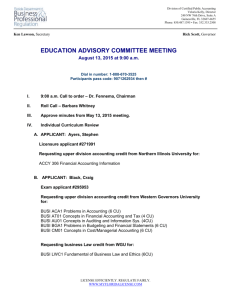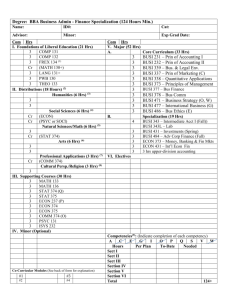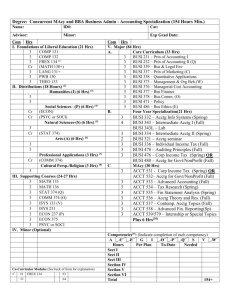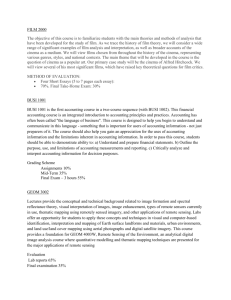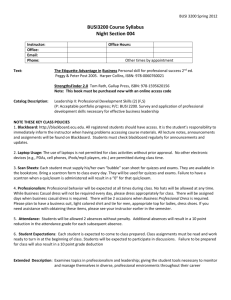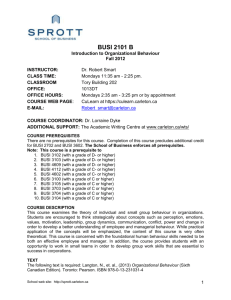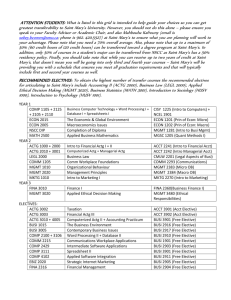- Carleton University
advertisement
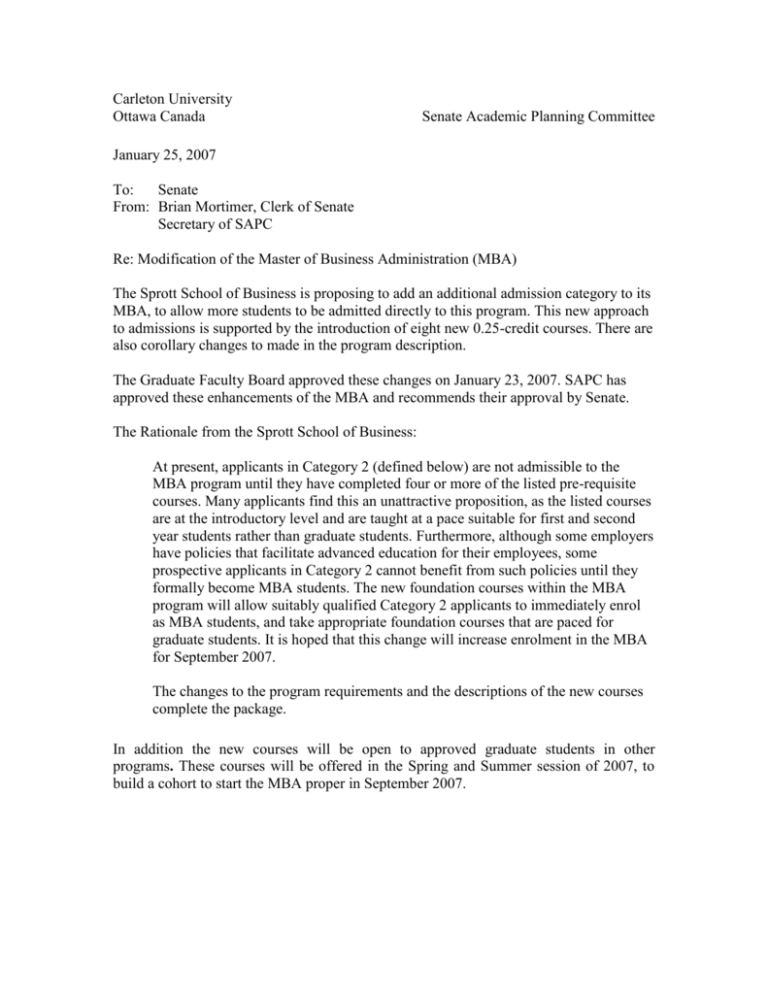
Carleton University Ottawa Canada Senate Academic Planning Committee January 25, 2007 To: Senate From: Brian Mortimer, Clerk of Senate Secretary of SAPC Re: Modification of the Master of Business Administration (MBA) The Sprott School of Business is proposing to add an additional admission category to its MBA, to allow more students to be admitted directly to this program. This new approach to admissions is supported by the introduction of eight new 0.25-credit courses. There are also corollary changes to made in the program description. The Graduate Faculty Board approved these changes on January 23, 2007. SAPC has approved these enhancements of the MBA and recommends their approval by Senate. The Rationale from the Sprott School of Business: At present, applicants in Category 2 (defined below) are not admissible to the MBA program until they have completed four or more of the listed pre-requisite courses. Many applicants find this an unattractive proposition, as the listed courses are at the introductory level and are taught at a pace suitable for first and second year students rather than graduate students. Furthermore, although some employers have policies that facilitate advanced education for their employees, some prospective applicants in Category 2 cannot benefit from such policies until they formally become MBA students. The new foundation courses within the MBA program will allow suitably qualified Category 2 applicants to immediately enrol as MBA students, and take appropriate foundation courses that are paced for graduate students. It is hoped that this change will increase enrolment in the MBA for September 2007. The changes to the program requirements and the descriptions of the new courses complete the package. In addition the new courses will be open to approved graduate students in other programs. These courses will be offered in the Spring and Summer session of 2007, to build a cohort to start the MBA proper in September 2007. Master of Business Administration Admission Requirements Old Version Admission into the program is judged primarily on the applicant’s ability to successfully undertake advanced study in business, prospects for successful and timely completion, work experience and achievement. Applicants to the Research Thesis option are also assessed in terms of their potential for independent research. Applicants are expected to have the equivalent of an Honours bachelor’s degree, with a minimum of high honours standing. Applicants are expected to have credits in mathematics and to have completed the following core courses, or their equivalents, in the functional areas of business: • BUSI 1001 Principles of Financial -Accounting • BUSI 1002 Management Accounting • BUSI 2101 Introduction to Organizational Behaviour • BUSI 2208 Introduction to Marketing, or BUSI 2204: Basic -Marketing • BUSI 2300 Introduction to -Management Science • BUSI 2400 Introduction to Information Systems • BUSI 2504 Essentials of Business Finance • ECON 2200 Statistical Methods in the Social Sciences In addition, applicants are expected to have an upper-level course sequence in their proposed area of business specialization, and to have an adequate grounding in at least one supporting fundamental discipline such as economics, psychology, sociology, mathematics, anthropology, or computer science. The Sprott School requires that all applicants submit scores . . . New Version Admission into the program is judged primarily on the applicant’s ability to successfully undertake advanced study in business, prospects for successful and timely completion, work experience and achievement. Applicants to the Research Thesis option are also assessed in terms of their potential for independent research. Admissible applicants fall into two categories, for which the program requirements (see section below) are different. Category 1: Applicants in this category are expected to have the equivalent of an Honours bachelor’s degree, with a minimum of high honours standing. They are also expected to have credits in mathematics and to have completed the following core courses, or their equivalents, in the functional areas of business: • BUSI 1001 Principles of Financial Accounting • BUSI 1002 Management Accounting • BUSI 2101 Introduction to Organizational Behaviour • BUSI 2208 Introduction to Marketing, or BUSI 2204: Basic Marketing • BUSI 2300 Introduction to Management Science • BUSI 2400 Introduction to Information Systems • BUSI 2504 Essentials of Business Finance • ECON 2200 Statistical Methods in the Social Sciences In addition, applicants in this category are expected to have an upper-level course sequence in their proposed area of business specialization, and to have an adequate grounding in at least one supporting fundamental discipline such as economics, psychology, sociology, mathematics, anthropology, or computer science. Category 2: Applicants in this category are expected to have the equivalent of an Honours bachelor’s degree, with a minimum of high honours standing, but may be lacking some or all of the business functional area courses listed above. Applicants in this category may be admitted directly into the MBA program, but they will have to complete some or all of the graduate level foundation courses listed below under Program Requirements. The Sprott School requires that all applicants submit scores . . . Program Requirements Old Version The requirement for the Master of Business Administration degree is the equivalent of 5.0 credits, of which at least 4.0 credits must be at the 5000-level or above. Candidates are required to select and follow one of the optional program patterns below, chosen in consultation with, and subject to the approval of, the supervisor of graduate studies at the Sprott School: Research Project Program • 0.5 credit from BUSI 5902, Business Research Methods or BUSI 5903, Multivariate Statistics for Business Research (as approved by the supervisor of graduate studies at the Sprott School) • 2.0 credits of integrative courses: BUSI 5805, Innovation Management; BUSI 5806, Managing Transformational Change; BUSI 5807, Digital Business; BUSI 5808, Enterprise Development • 1.5 credits of approved electives, selected from those offered by the Sprott School or by other academic units, and approved by the Sprott School as suitable for the student’s program. • Research Project BUSI 5908 (1.0 credit) Research Thesis Program • 1.5 credits of required courses, BUSI 5902, Business Research Methods, BUSI 5903, Multivariate Statistics for Business Research, BUSI 5907, MBA Thesis Tutorial • 1.0 credit of integrative courses: one of BUSI 5805, Innovation Management or BUSI 5806, Managing Transformational Change, and one of BUSI 5807, Digital Business or BUSI 5808, Enterprise Development • 1.0 credit of approved electives, selected from those offered by the Sprott School or by other academic units, and approved by the Sprott School as suitable for the student’s program. • Research Thesis BUSI 5909 (1.5 credits) New Version Program requirements differ depending on the admissions category under which the student is admitted. Category 1: For students admitted under Category 1 admission requirements, the program requirement for the Master of Business Administration degree is the equivalent of 5.0 credits, of which at least 4.0 credits must be at the 5000-level or above. Candidates are required to select and follow one of the optional program patterns below, chosen in consultation with, and subject to the approval of, the Director of the MBA program the Sprott School: Research Project Program • 0.5 credit from BUSI 5902, Business Research Methods or BUSI 5903, Multivariate Statistics for Business Research (as approved by the supervisor of graduate studies at the Sprott School) • 2.0 credits of integrative courses: BUSI 5805, Innovation Management; BUSI 5806, Managing Transformational Change; BUSI 5807, Digital Business; BUSI 5808, Enterprise Development • 1.5 credits of approved electives, selected from those offered by the Sprott School or by other academic units, and approved by the Sprott School as suitable for the student’s program. • Research Project BUSI 5908 (1.0 credit) Research Thesis Program • 1.5 credits of required courses, BUSI 5902, Business Research Methods, BUSI 5903, Multivariate Statistics for Business Research, BUSI 5907, MBA Thesis Tutorial • 1.0 credit of integrative courses: one of BUSI 5805, Innovation Management or BUSI 5806, Managing Transformational Change, and one of BUSI 5807, Digital Business or BUSI 5808, Enterprise Development • 1.0 credit of approved electives, selected from those offered by the Sprott School or by other academic units, and approved by the Sprott School as suitable for the student’s program. • Research Thesis BUSI 5909 (1.5 credits) Category 2: In addition to the program requirements described above, students admitted under Category 2 admission requirements must first complete some or all of the following graduate level quarter credit (0.25 cr) foundation courses: • • • • • • • • BUSI 5004, Accounting I BUSI 5005, Accounting II BUSI 5104, Organization Behaviour BUSI 5204, Marketing BUSI 5404, Information Systems BUSI 5504, Finance BUSI 5604, Management Science BUSI 5904, Data Analysis Precisely which foundation courses each student should take will be determined by the Director of the MBA program, based on the student’s previous education. The sequencing of each student’s program will also depend on the completion of foundation courses and will be determined by the Director of the MBA program. The total credit value of the MBA program for students admitted in Category 2 will be the 5.0 full credits plus the foundation course credits, to a maximum of seven (7.0) credits. New Courses BUSI 5004 [0.25 credit] Accounting I Concepts of asset valuation and income measurement underlying the preparation of financial statements; how to use and interpret information found in financial statements and understand how accounting policy choice affects financial results and financial decision making. BUSI 5005 [0.25 credit] Accounting II Development, use and interpretation of accounting information by managers within an organization for planning, control and performance evaluation. Topics include cost concepts, cost-volume-profit relationships, product & service costing, budgeting, relevant costing, responsibility accounting and balanced scorecard. BUSI 5104 [0.25 credit] Organization Behaviour Individual and small group behaviour in organizations. Topics include perception, motivation,communication, group dynamics and organizational politics to understand employee and managerial behaviour. BUSI 5204 [0.25 credit] Marketing An overview of the marketing function within the firm. Buyer behaviour, market segmentation and targeting are presented, and promotion, product/service strategy, pricing and distribution channels are introduced. BUSI 5404 [0.25 credit] Information Systems Management issues associated with information systems. Topics include electronic commerce, types and development of information systems, fundamental technology impacts, information systems alignment, and associated ethical issues. BUSI 5504 [0.25 credit] Finance Areas of decision making typically analysed and executed within the Chief Financial Officer (CFO) organisation. Typical areas covered are: financing, and CAPEX decisions; working capital management; role of capital markets, financial planning and forecasting; mergers and acquisitions BUSI 5604 [0.25 credit] Management Science Management science techniques for business decision making. Emphasizes model formulation, computer implementation, and analysis of model results. BUSI 5904 [0.25 credit] Data Analysis Statistical inference and data analysis and their relevance to managerial decision making. Topics will include statistical significance, practical significance, estimation, modelling, forecasting, sampling and error, non-sampling errors and bias, and causality.
